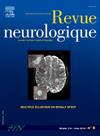多发性硬化症的精神病发作:系统回顾和荟萃分析。
IF 2.3
4区 医学
Q2 CLINICAL NEUROLOGY
引用次数: 0
摘要
背景:尽管存在许多病例报告显示不一致的结果,但对多发性硬化症(MS)的精神症状的研究很少。我们的目的是评估多发性硬化症患者精神病发作的时间和检查其特征。材料和方法:我们根据PRISMA 2020进行了系统评价和荟萃分析。我们通过PubMed, b谷歌Scholar, Web of Science和Cochrane在MEDLINE上检索MS精神病的病例报告和病例系列。采用SPSS 26软件进行数据分析。结果:共回顾43例病例。双相情感障碍和精神分裂症(SCZ)是最常见的类型。精神疾病常在MS诊断前或诊断时出现。对于MS诊断前有精神病的患者,与其他精神病类型的患者相比,SCZ患者更不容易出现神经系统症状。多态妄想与多发性硬化症后或并发的精神病发作显著相关。广泛的脑室周围白质病变、小脑脚和小脑病变与多发性硬化症诊断后精神病发作显著相关。出现耐药精神病的占59.4%。与其他形式的多发性硬化相比,复发缓解型多发性硬化患者的良好预后明显更常见。结论:我们的研究强调了在精神病患者中考虑多发性硬化的重要性,特别是那些患有SCZ或治疗难治性精神病的患者。一些白质病变可能在MS诊断后引发精神病。虽然治疗多发性硬化症患者的精神病具有挑战性,但针对多发性硬化症的治疗已被证明是有效的。本文章由计算机程序翻译,如有差异,请以英文原文为准。
Psychoses onset in multiple sclerosis: A systematic review and meta-analysis
Background
Psychotic symptoms in multiple sclerosis (MS) have been infrequently studied, despite the existence of numerous case reports showing inconsistent findings. Our aim was to assess the timing of psychosis onset and examine its characteristics in MS cases.
Material and methods
We conducted a systematic review and meta-analysis according to PRISMA 2020. We searched for case reports and case series of psychosis in MS on MEDLINE through PubMed, Google Scholar, Web of Science, and Cochrane. SPSS 26 was used to perform the data analysis.
Results
Overall, 43 cases were reviewed. Bipolar disorder and schizophrenia (SCZ) were the most frequently observed types. Psychosis was often present before or at the time of MS diagnosis. For patients with prior psychosis before MS diagnosis, those with SCZ were less likely to develop neurologic symptoms compared to those with other psychosis types. Polymorphic delusions were significantly associated with psychosis onset either after or concurrently with MS. Extensive periventricular white matter lesions, cerebellar peduncles, and cerebellar lesions were significantly associated with the onset of psychosis following MS diagnosis. Resistant-treatment psychosis occurred in 59.4% of cases. A favorable outcome was significantly more common in patients with relapsing-remitting MS compared to those with other forms of MS.
Conclusion
Our study highlights the importance of considering MS in patients with psychoses, especially those with SCZ or treatment-resistant psychosis. Some white matter lesions may trigger psychosis after MS diagnosis. While managing psychosis in MS can be challenging, MS-specific treatments have proven effective.
求助全文
通过发布文献求助,成功后即可免费获取论文全文。
去求助
来源期刊

Revue neurologique
医学-临床神经学
CiteScore
4.80
自引率
0.00%
发文量
598
审稿时长
55 days
期刊介绍:
The first issue of the Revue Neurologique, featuring an original article by Jean-Martin Charcot, was published on February 28th, 1893. Six years later, the French Society of Neurology (SFN) adopted this journal as its official publication in the year of its foundation, 1899.
The Revue Neurologique was published throughout the 20th century without interruption and is indexed in all international databases (including Current Contents, Pubmed, Scopus). Ten annual issues provide original peer-reviewed clinical and research articles, and review articles giving up-to-date insights in all areas of neurology. The Revue Neurologique also publishes guidelines and recommendations.
The Revue Neurologique publishes original articles, brief reports, general reviews, editorials, and letters to the editor as well as correspondence concerning articles previously published in the journal in the correspondence column.
 求助内容:
求助内容: 应助结果提醒方式:
应助结果提醒方式:


